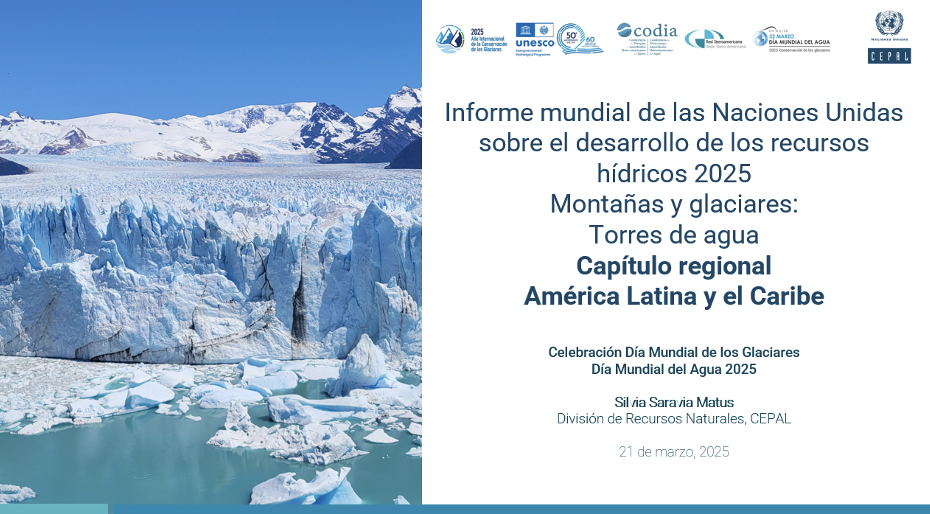ECLAC Presents Contribution to UN World Water Resources Report at 2025 World Glaciers and Water Day Event
Work area(s)
Topic(s)
On March 21, 2025, the Economic Commission for Latin America and the Caribbean (ECLAC) participated virtually in the regional hybrid event “Celebration of the First World Glaciers Day and World Water Day: Glacier Conservation,” held in Calafate, Argentina. The event brought together experts, authorities, and civil society representatives, with the aim of discussing the challenges and opportunities surrounding glacier conservation in the region, in the context of the International Year of Glacier Preservation and World Water Day.

The event also featured participation from prominent experts and representatives of organizations such as UNESCO, the World Meteorological Organization (WMO), the Conference of Ibero-American Water Directors and Authorities (CODIA), and the Intergovernmental Hydrological Programme for Latin America and the Caribbean (IHP-LAC).
Representing ECLAC, Ms. Silvia Saravia Matus, Economic Affairs Officer of the Natural Resources Division, and Ms. Lisbeth Naranjo, a consultant from the same division, presented the findings of the Latin America and Caribbean regional chapter of the 2025 United Nations World Water Development Report (WWDR), titled “Mountains and Glaciers: Water Towers”, prepared by ECLAC.
The presentation highlighted the region’s critical role as one of the planet’s “water towers,” noting that one-third of the region’s territory is mountainous, generating more water flow than other continents. Special emphasis was placed on the Andes Mountains as the main source of water in the region—home to the headwaters of 65% of rivers in the Andean countries, and contributing 50% of the Amazon River’s flow.
However, they also warned of the accelerated glacier retreat in the region—among the fastest in the world—with a 30% to 50% loss of Andean glacier area since the 1980s. This phenomenon not only threatens water availability, but also has significant consequences for agriculture, food production, public health, hydropower generation, and the livelihoods and human settlements that depend on these water sources
Despite these challenges, the presentation emphasized that the region is advancing innovative solutions, many of which are rooted in ancestral knowledge, community-based management, and legal frameworks for water conservation. Examples included ancestral irrigation systems in Bolivia, dams in peri-glacial lagoons in Peru, conservation incentives in Ecuador, and glacier protection laws in Argentina.
Finally, ECLAC called for strengthening institutional capacities in countries across the region, including technical, operational, political, and foresight (TOPP) capacities. Specific recommendations included investing in green infrastructure and conservation, prioritizing nature-based solutions, enhancing local governance, building technical capacity, and fostering strong political will to ensure the long-term conservation of glaciers and mountain ecosystems.
Country(ies)
- Argentina